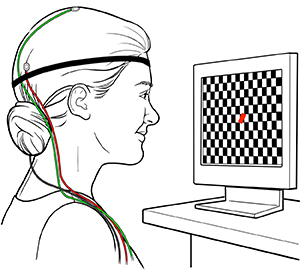Having an Evoked Potential Test
Evoked potential tests measure the electrical activity in the brain as nerve pathways are stimulated. Testing is done in a quiet room. The technologist will explain how your test or tests will be done.
For your safety and for the success of your test, tell the technologist:
You may also be asked questions about your overall health.
Before your test
Get ready for your test as instructed. Don’t use lotion, oil, powder, or hairstyling products. Wear loose clothes. You may be asked to change into a hospital gown. Your testing may last from 30 minutes to 4 hours depending on how many tests you’re having. Be sure to allow extra time to check in.
Visual evoked potential (VEP)
You will sit a few feet from a screen. The technologist will attach small metal disks (electrodes) to your scalp. You will be asked to gaze at a dot at the center of the screen. With a patch over one eye, you will watch a checkerboard pattern reversing on the screen. This test will then be repeated with your other eye.
 |
| Visual evoked potential test |
Brainstem auditory evoked potential (BAEP)
You will be seated for this test. The technologist will attach electrodes to your head and on or behind your ears with gel or paste. You will then wear headphones. You will hear clicking sounds or tones first in one ear, then in the other. You will also hear a constant noise through the headphones.
Somatosensory evoked potential (SSEP)
You will lie back in a reclining chair or lie down on an exam table. Electrodes will be placed on parts of your body, such as your head, spine, arms, or legs. One test is of the arms, and one is of the legs. The technologist will apply mild electrical currents to the nerves in your wrists or ankles. You may feel your muscles twitch. But know that the test won’t harm you.
After your test
Before you leave, all electrodes will be removed. You can then return to your normal routine. If you took medicine to help you relax for any test, arrange to have someone drive you home. Your healthcare provider will let you know when your test results are ready.
Online Medical Reviewer:
Joseph Campellone MD
Online Medical Reviewer:
Raymond Kent Turley BSN MSN RN
Date Last Reviewed:
11/1/2021
© 2000-2024 The StayWell Company, LLC. All rights reserved. This information is not intended as a substitute for professional medical care. Always follow your healthcare professional's instructions.